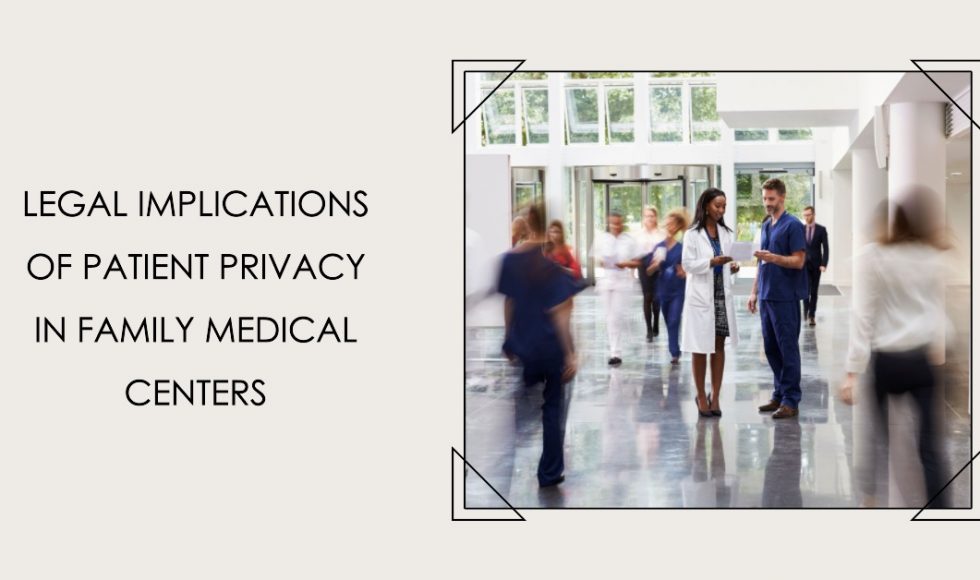In today’s technologically advanced world, patient privacy is a constant concern for medical professionals and patients alike. As healthcare providers strive to offer the best care possible, they must also navigate an increasingly complex legal landscape surrounding the protection of personal health information.
Family medical centers, in particular, face unique challenges when it comes to understanding and adhering to laws governing patient privacy. It’s essential that both practitioners and administrators are well-versed in these regulations to ensure compliance and maintain trust with their patients.
One might think that safeguarding patient confidentiality would be relatively simple; after all, isn’t it just about keeping people’s records private? Unfortunately, the reality is far more nuanced than that. With constantly shifting legislation at both state and federal levels – not to mention varying interpretations of existing laws by different courts – even seasoned healthcare professionals can find themselves struggling to stay current on this ever-evolving issue.
This article will delve into some of the key legal implications of patient privacy in family medical centers, providing insight from a legal analyst perspective as we explore what every provider should know about protecting their patients’ sensitive information.
Legal Consequences For Violating Patient Privacy
The Health Insurance Portability and Accountability Act (HIPAA) sets forth strict regulations regarding the protection of patients’ personal health information. Violations of these rules can result in serious legal ramifications for family medical centers, including civil and criminal penalties.HIPAA violations may occur due to failure to implement appropriate safeguards, unauthorized access or disclosure of protected health information, or even negligence in providing necessary privacy training to staff members. In addition to HIPAA enforcement actions by the federal government, state attorneys general also have authority to pursue claims on behalf of their residents.
Medical identity theft and confidentiality breaches further exacerbate the legal liabilities faced by healthcare providers who fail to uphold stringent privacy standards. When a patient’s confidential data is compromised, it can lead not only to financial harm but also significant damage to an individual’s reputation and emotional well-being.
Healthcare organizations must prioritize robust privacy training programs that emphasize compliance with both federal and state law while fostering a culture of respect for patient confidentiality throughout their operations. By taking proactive measures to prevent privacy incidents from occurring, family medical centers minimize their risk exposure and ensure they maintain trust within the communities they serve.
Requirements For Obtaining Patient Authorization For Disclosure Of Medical Information
In the realm of patient privacy, obtaining proper authorization for the disclosure of medical information is a crucial aspect that family medical centers must navigate diligently.
The process generally involves informed consent, wherein patients are made aware of the purpose and extent to which their personal health information may be shared or used.
In addition to this foundational step, healthcare providers should also adhere to strict guidelines when developing an authorization process in order to ensure compliance with confidentiality agreements and other legal obligations.
It is essential for family medical centers to establish comprehensive privacy training programs for staff members who handle sensitive patient data.
This includes educating personnel on disclosure limitations as well as best practices in safeguarding patient records against unauthorized access.
Moreover, organizations need to implement robust security measures such as encryption technologies and secure networks to further protect confidential information from potential breaches.
By fostering a culture of awareness and vigilance around patient privacy issues within their facilities, healthcare providers can not only mitigate risks but also foster trust between themselves and the individuals they serve.
Patients’ Rights To Access And Request Corrections To Medical Records
One of the key aspects of patient privacy in family medical centers is ensuring that patients have adequate access to their own medical records, as well as the ability to request corrections if they believe there are inaccuracies. Ensuring record accuracy is not only important for maintaining trust between healthcare providers and patients but also has significant implications on the quality of care provided. Inaccurate or incomplete medical records can lead to potentially dangerous medical errors, misdiagnoses, and inappropriate treatment plans.
Furthermore, when patients have access to their own health information, it fosters a sense of patient empowerment and encourages them to take an active role in managing their health.
Privacy policies play a crucial role in outlining how family medical centers handle sensitive patient data while upholding individuals’ rights to review and amend such information. These policies should clearly state how patients can obtain copies of their records, what steps need to be taken if they wish to request corrections, and under what circumstances these requests may be denied (e.g., if the proposed change would negatively impact the integrity of the original record).
Additionally, informed consent must be obtained from each patient before their personal health information is shared with other parties or used for purposes beyond direct clinical care. By adhering to strict guidelines surrounding access control, correction processes, and consent management, family medical centers demonstrate a commitment towards safeguarding patient privacy while empowering individuals with greater knowledge about their own health status.
Security Of Electronic Health Records
The rapid advancement of technology has undoubtedly revolutionized the healthcare industry, but with it comes an ever-growing concern for patient privacy in a digital world. As electronic health records (EHRs) become increasingly prevalent in family medical centers, addressing potential data breaches and implementing robust cybersecurity measures is crucial to upholding the legal principles surrounding patient confidentiality.
One of the primary ways to protect EHR systems from unauthorized access or theft is by employing strong encryption methods that secure sensitive information both at rest and during transmission between authorized users. Alongside this, continuously updating software applications and firewalls can help mitigate threats posed by hackers and other external sources.
Staff training plays a significant role as well; ensuring all employees are knowledgeable about HIPAA regulations and best practices in handling protected health information will minimize human error-related incidents. Additionally, considering remote access risks is essential when designing security protocols, particularly as telemedicine becomes more widespread.
By investing time and resources into these areas, family medical centers can build a solid foundation for maintaining patients’ trust while adhering to their legal obligations regarding privacy protection.
State Laws Related To Patient Privacy
It is crucial to recognize that state laws related to patient privacy often provide additional protections beyond those offered by the federal Health Insurance Portability and Accountability Act (HIPAA).
In some cases, these state confidentiality requirements may impose more stringent rules on family medical centers. For instance, states might have their own set of regulations governing minors’ privacy rights, genetic information protection, or the handling of mental health records.
As a result, healthcare providers must be diligent in familiarizing themselves with both HIPAA and any relevant state legislation when developing policies and procedures for maintaining patient privacy.
While HIPAA serves as a baseline for protecting patients’ sensitive information across the United States, it’s essential not to overlook variations among individual states.
These differences can significantly impact how family medical centers handle matters such as obtaining consent from minors or disclosing genetic test results to third parties.
Thus, remaining aware of specific state statutes pertaining to patient privacy ensures compliance with all applicable legal obligations while also fostering trust between healthcare providers and their patients – a critical aspect of delivering high-quality care in today’s increasingly interconnected world.
Conclusion
In conclusion, it is crucial for family medical centers to adhere strictly to patient privacy laws and regulations. Any breach of these rules can result in severe legal consequences, not only damaging the reputation of a healthcare provider but also attracting hefty fines or penalties.
As a legal analyst on patient privacy, I strongly recommend that both patients and healthcare providers stay informed about their rights and responsibilities when handling sensitive medical information.
This will ensure smooth operations at family medical centers while maintaining trust between all parties involved.

